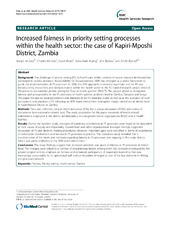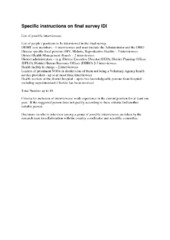| dc.contributor.author | Zulu, Joseph | en_US |
| dc.contributor.author | Michelo, Charles | en_US |
| dc.contributor.author | Msoni, Carol | en_US |
| dc.contributor.author | Hurtig, Anna-Karin | en_US |
| dc.contributor.author | Byskov, Jens | en_US |
| dc.contributor.author | Blystad, Astrid | en_US |
| dc.date.accessioned | 2014-09-16T09:43:55Z | |
| dc.date.available | 2014-09-16T09:43:55Z | |
| dc.date.issued | 2014-02-18 | eng |
| dc.identifier.issn | 1472-6963 | |
| dc.identifier.uri | https://hdl.handle.net/1956/8485 | |
| dc.description.abstract | Background: The challenge of priority setting (PS) in health care within contexts of severe resource limitations has continued to receive attention. Accountability for Reasonableness (AFR) has emerged as a useful framework to guide the implementation of PS processes. In 2006, the AFR approach to enhance legitimate and fair PS was introduced by researchers and decision makers within the health sector in the EU funded research project entitled ‘Response to Accountable priority setting for Trust in health systems’ (REACT). The project aimed to strengthen fairness and accountability in the PS processes of health systems at district level in Zambia, Tanzania and Kenya. This paper focuses on local perceptions and practices of fair PS (baseline study) as well as at the evolution of such perceptions and practices in PS following an AFR based intervention (evaluation study), carried out at district level in Kapiri-Mposhi District in Zambia. Methods: Data was collected using in depth interviews (IDIs), focus group discussions (FGDs) and review of documents from national to district level. The study population for this paper consisted of health related stakeholders employed in the district administration, in non-governmental organizations (NGO) and in health facilities. Results: During the baseline study, concepts of legitimacy and fairness in PS processes were found to be grounded in local values of equity and impartiality. Government and other organizational strategies strongly supported devolution of PS and decision making procedures. However, important gaps were identified in terms of experiences of stakeholder involvement and fairness in PS processes in practice. The evaluation study revealed that a transformation of the views and methods regarding fairness in PS processes was ongoing in the study district, which was partly attributed to the AFR based intervention. Conclusions: The study findings suggest that increased attention was given to fairness in PS processes at district level. The changes were linked to a number of simultaneous factors among them the concepts introduced by the present project with its emphasis on fairness and enhanced participation. A responsive leadership that was increasingly accountable to its operational staff and communities emerged as one of the key elements in driving the processes forward. | en_US |
| dc.language.iso | eng | eng |
| dc.publisher | BioMed Central | eng |
| dc.rights | Attribution CC BY | eng |
| dc.rights.uri | http://creativecommons.org/licenses/by/2.0 | eng |
| dc.subject | Fairness | eng |
| dc.subject | Priority setting | eng |
| dc.subject | Health sector | eng |
| dc.subject | Zambia | eng |
| dc.title | Increased fairness in priority setting processes within the health sector: the case of Kapiri-Mposhi District, Zambia | en_US |
| dc.type | Peer reviewed | |
| dc.type | Journal article | |
| dc.date.updated | 2014-04-02T10:40:24Z | |
| dc.description.version | publishedVersion | en_US |
| dc.rights.holder | Copyright 2014 Zulu et al.; licensee BioMed Central Ltd. | |
| dc.rights.holder | Joseph M Zulu et al.; licensee BioMed Central Ltd. | |
| dc.source.articlenumber | 75 | |
| dc.identifier.doi | https://doi.org/10.1186/1472-6963-14-75 | |
| dc.identifier.cristin | 1159008 | |
| dc.source.journal | BMC Health Services Research | |
| dc.source.40 | 14 | |



